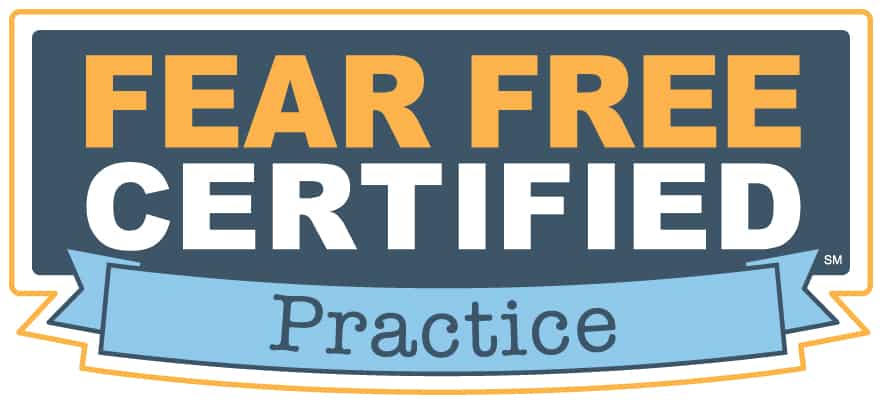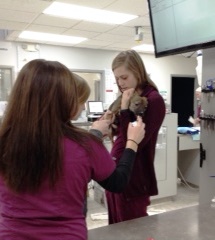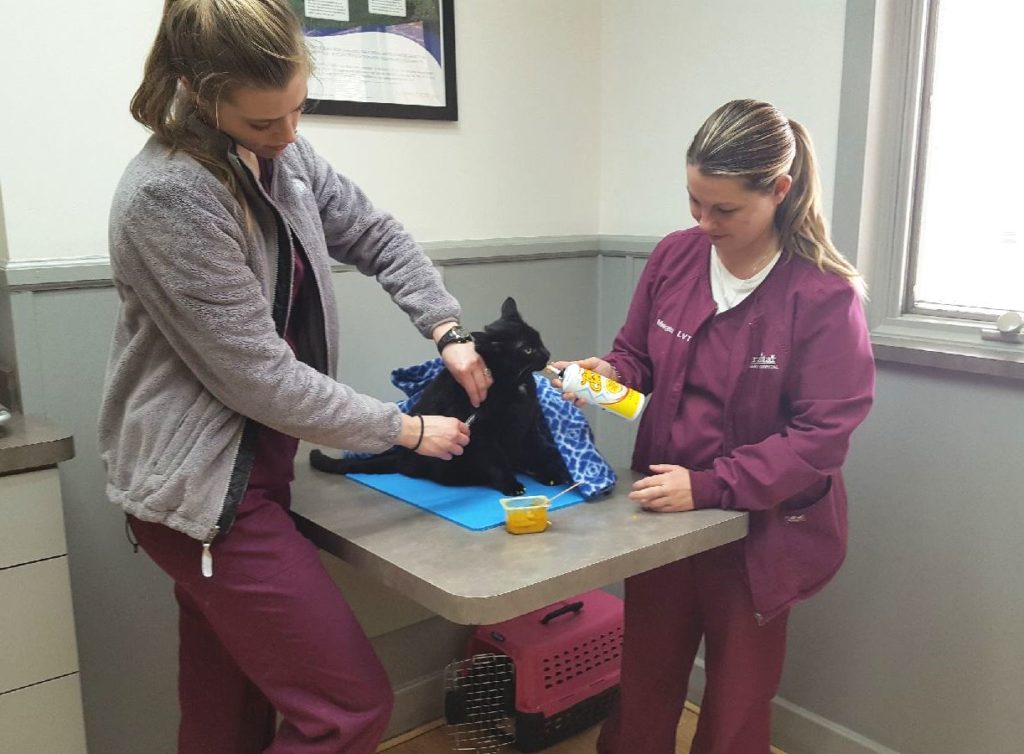
Fear Free Certified
Michigan’s 1st Fear Free Practice
Gibraltar Veterinary Hospital has always been committed to excellence and compassion. We are proud to be the 1st Fear Free Certified Practice in Michigan and 6th in the Nation. Our team is dedicated to caring for your pet’s emotional as well as physical well being.
It’s our goal to help you develop a powerful, life–long, mutually beneficial relationship with your dog or cat; one that for all parties is as free as possible of the fear, anxiety, and stress that can take a toll on even the most devoted of relationships.
What do we mean when we say that a veterinary visit is Fear Free?
A veterinary team member who is Fear Free certified wants your pet to be happy when he comes through the door of the clinic. Fear Free doesn’t mean that your pet will never experience anything uncomfortable at the veterinarian, they may be injured or ill, but it does mean that we make every effort to reduce any fear, anxiety, and stress-related to examinations and procedures.
What should I expect during my Fear Free visit?

At Gibraltar Veterinary Hospital, our goal is to make your visit as stress-free as possible for you and your pet. We want to create positive experiences with every visit. Here are some techniques you may notice our staff practicing at your visit.
- Initially avoid eye contact with your pet and focus on you instead.
- Feed treats to your pet to distract them, reduce stress, and create a bond with them. We use a variety of treats including cheese and peanut butter. Please let our staff know if you or your pet have any food allergies.
- Provide or use non-slip surfaces for your pet to sit or stand for balance and stability.
- Use gentle pressure to soothe your pet using a towel or blanket.
- Create a calming environment using pheromones and diffusers.
- Actively work to reduce stressful noises.
- Prescribe anti-anxiety or other calming medications when necessary
If your pet is showing excessive signs of fear, anxiety, or stress, we may suggest postponing the exam or procedures until a time when your pet is calmer and more relaxed. We do not want to create bad experiences.
Preparing for your Fear Free veterinary visit

We need your help to make your pet’s visit as Fear Free as possible. One thing you can do is to ensure that your pet gets to the veterinary hospital in a calm state of mind. The following tips will help you and your pet arrive in one piece and in peace.
- Hungry is good. If medically appropriate, reduce the amount of food your pet eats before a veterinary visit. This can help prevent nausea with car travel as well as make the treats at the veterinary visit more appealing.
- Treat bonanza. Bring a good amount of your pet’s favorite treats, in small pieces. Your pet likes a variety of treats? Bring an assortment! Even your cat’s canned food might do the trick. Treats should be no larger than half a pea or a single lick. You might not use all of them, but it is better to have too many than not enough.
- Favorite toys and a grooming brush. Bring some familiar items your pet likes. This will help your pet relax in the veterinary hospital. The veterinary team may ask you to use these items to help distract your pet during the visit.
- Towel, shirt, blanket, or bed sprayed with species-specific calming pheromones or lavender. Commercially available calming pheromones can help promote relaxation. The scent of lavender has been shown to have a calming effect on dogs during car travel. An item that smells like home, such as a blanket your pet sleeps on or a t-shirt you’ve worn can also provide comfort for your pet. For dogs, consider spraying a bandanna with a calming pheromone and placing it on your dog’s neck. When you use pheromone sprays, allow the pheromone to dry for 10 to 15 minutes before exposing your pet to the sprayed item.
- Provide your pet with an opportunity to relieve himself prior to leaving your home (if there are no medical issues) and again before you go into the clinic. Nothing escalates stress more than having a full bladder or colon and no access to a bathroom.
- Budget plenty of time to avoid being rushed. If you are stressed, your pet will be too. If your veterinarian has prescribed any anti-nausea or anti-anxiety supplements or medications, make sure to give them as prescribed. The average fear free appointment takes 60-90 minutes.
- Make sure your pet is acclimated to a carrier, crate, or seat belt harness and is not stressed by travel confinement. Make sure your pet is comfortable with confinement for travel. Carriers for cats and small dogs or crates or seat belt harnesses for medium-sized to large dogs are safe options for car travel. Use yummy treats to condition your dog to wearing a seat belt harness. Keep the carrier/crate out in commonly used areas of the house at all times and incorporate some of these techniques to create a carrier/crate oasis:
- put your pet’s favorite toys or bedding near or in the carrier/crate;
- play with your pet near the carrier/crate;
- place a pheromone-infused towel or bed or an object of clothing permeated with your scent inside the confinement area;
- place treats, catnip (for our feline friends), or a rubber food puzzle toy with canned food inside the carrier;
- and feed your pet in or near the carrier/crate.
- Let your pet enter on his/her own. You can teach your pet to enter the carrier/crate on cue to earn a food reinforce, or toss a treat or toy into the carrier/crate.
- Once the pet is comfortable in the carrier, take the pet for brief test drives. Ensure that these drives are positive experiences. Initially, only drive a short distance (eg, one or two blocks). Gradually increase the distance as the pet’s anxiety decreases. The goals are to allow the cat to become comfortable with car travel, and to minimize fear or anxiety by teaching them that a ride in the carrier does not always end at the veterinary hospital.
Talk to us if you think anti-nausea or anti-anxiety supplements or medications would help your pet have a more pleasant veterinary experience. 734-675-5020.
